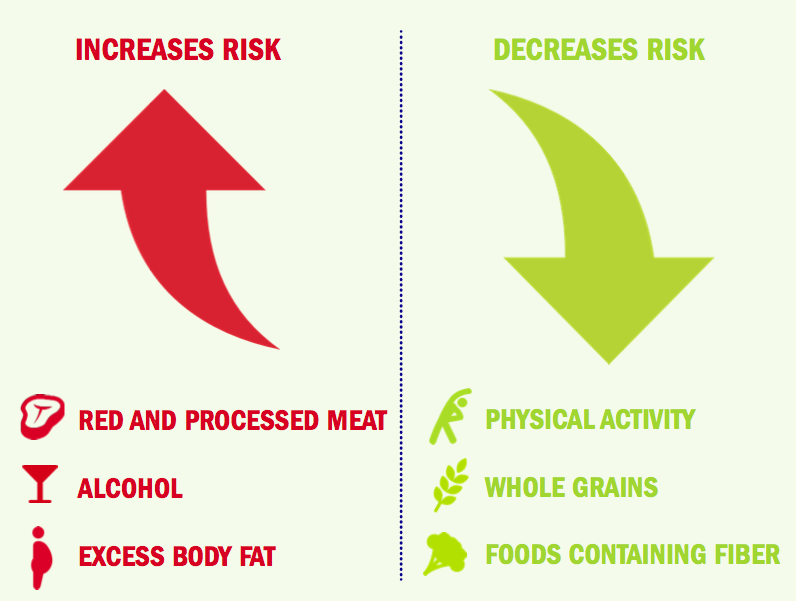A new analysis, published in the Lancet Public Health, reporting the significant increase in obesity-related cancers among younger adults in the U.S. grabbed media headlines because the findings are worrisome in the context of the rising trend of obesity, particularly childhood obesity, in the United States. The researchers noted that the increased rates were particularly apparent in six of the 12 obesity-related cancer types in patients aged 25-49 years. Colorectal cancer is one of the obesity-related cancers and the increasing rates of colorectal cancer in younger adults has already been causing alarm and has prompted physicians and researchers to investigate the potential causes for this early-onset disease over the past decade.

Obesity and Early-Age Onset Colorectal Cancer
On the surface, the rise in obesity rates over the past 30 years has conveniently coincided with the rise of early age onset colorectal cancers, generally defined as being diagnosed with colorectal cancer under 50 years of age. Obesity is causally linked to 12 different cancers and plausible biological mechanisms are well documented. However, closer scrutiny shows that obesity cannot be the whole story. Other lifestyle risk factors for colorectal cancer linked with obesity are physical inactivity and sedentary behavior, while additional factors including red and processed meat consumption, alcohol consumption increase risk through other mechanism.
In addition, these lifestyle and other factors are linked to the health of the trillions of bacteria in our gastrointestinal system (called the “gut microbiome”). These bacteria can protect us when our gut “microflora” is healthy or can be a detrimental influence when our gut microflora is not optimal. Contributions of the gut microbiome in young-onset colorectal cancer is currently an area of intense research interest and activity.
The American Cancer Society has conducted extensive analyses of the rising incidence of young-onset colorectal cancer and have identified a birth cohort effect, observing a prominent uptick in incidence (rate of new diagnoses) in 1964. If we think about the natural history of the disease, it is likely that exposures beginning around the 1950s may provide potential clues. Both of these dates precede the advent of the obesity epidemic that really emerged in the 1980s and 1990s. Consequently, although studies suggest obesity is a contributing factor to the alarming increases in younger adults, there must be additional lifestyle factors – posibbly exacerbated by obesity- that we cannot yet account for.
Our group has studied the well-characterized precursor to colorectal cancer – the adenomatous polyp and, specifically, factors associated with colorectal adenoma recurrence under 50 years of age. We found a statistically significant difference in the baseline characteristics of participants <50 years of age compared to those ≥50 years of age. The under 50 population were more likely to have higher intakes of saturated fatty acids, higher consumption of red meat, more likely to consume a pro-inflammatory diet (as measured by the dietary inflammatory index), and more likely to be current smokers.
A Scientific Conundrum
However, each year, I attend the Early Age Onset Colorectal Cancer (EAO-CRC) Summit in New York City and I am struck by the accounts, from patients, parents, siblings, and friends of young-onset colorectal cancer patients, that their loved one was “young, fit, and healthy” prior to their colorectal cancer diagnosis. They ate well, they exercised, and generally took care of their health. Some had run marathons just months before the day they received the news that they had colorectal cancer. Most had no known family history or inherited genetic conditions.
The rise in EAO-CRC is likely the result of an array of potentially interacting factors, both modifiable and unmodifiable. But it is more than a scientific conundrum: it is an urgent clinical need and priority for researchers to investigate so that any further increases in colorectal cancer cases can be avoided and preventative strategies developed.






Why doesn’t anyone look at the antibiotic connection. My sister who died from colorectal cancer pinpointed the date her problems with her anus started as within 4 days of taking an antibiotic (a fluoroquinolone). Did you know that in 2014 researchers in the United Kingdom found that people who had taken a class of antibiotics called “fluoroquinolones” (levofloxacin, ciprofloxacin, anything ending in floxacin) were 8-11% more likely to develop colon cancer within 6 months of taking the prescribed medication. This information was presented at a cancer conference on 1 June 2014 at the American Society of Clinical Oncology (ASCO) annual meeting and was called the “Impact of Antibiotic Exposure on the Risk of Colorectal Cancer” and can you believe since then nothing has been done to add the possibility of getting cancer to the drug labels on the fluoroquinolone class of drugs. Within 2 months of taking levofloxacin my sister was diagnosed with colorectal cancer and prior to this she was an extremely healthy woman. If you go to the Reelz Channel on TV and watch or tape a show scheduled to be aired on Sunday, March 10 at 6 p.m. called Autopsy: The Last Hours of Farrah Fawcett (a show that aired originally on 3/11/2018) you will see a forensic pathologist look at the antibiotic connection as a possible cause of Farrah’s cancer. I have already taped this show and it mentions this connection at 55:18 on the timeline (pause/play) https://www.reelz.com/autopsy/ The forensic pathologist on the show studied the antibiotic connection because Farrah Fawcett was very proactive in her health and took large amounts of antibiotics. The antibiotics that my sister was given was levofloxacin and prednisone to take at the same time (concomitantly) even though the FDA didn’t recommend it at the time and had a warning out on this.